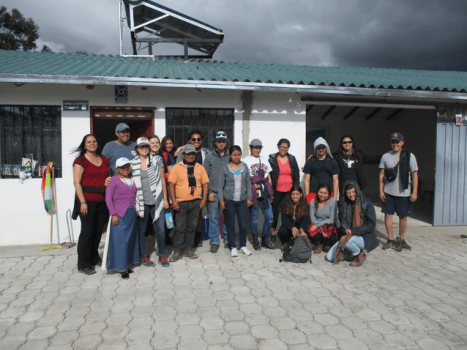
Ecuador service-learning trip volunteers working on community tourist site to welcome visitors to a local sacred site.
The Max A. Shacknai Center for Outreach, Volunteerism, and Education (COVE) and the Lampert Institute for Civic and Global Affairs developed a partnership over the last year to develop a long-term relationship with the Tandana Foundation, a nonprofit organization in Ecuador, to develop a series of rich, service-learning experiences for our students. A long-term service-learning program in Ecuador aligns well with the mission of the Lampert Institute and allows Colgate University to expand its offerings in Latin America, a locale currently underserved in our international programs. We plan to send two groups of 10 students and two faculty each year. We envision that the focus of the group will change from year to year, depending on the needs of the local communities and the academic interests of the group leaders.
All of the projects are done with the local community and serve their direct needs. The leadership of each community determines what projects they want Tandana to help with. Projects range from infrastructure (community houses, schoolrooms, etc.), tutoring, school gardens, reforestation projects, weather station, health care projects, and more. Local community members are asked to invest their time, labor, and resources in the projects and to work alongside the students.
Our program each year will be thematic and may depend on the interests of the accompanying faculty member (e.g., women’s rights, environmental issues). Our long-term goals include developing sustainable relationships with local communities. Over time, we hope that faculty will develop research agendas that address issues of local relevance. We feel this partnership will support the economic health, development, and well-being of underserved agrarian communities in Ecuador, as well as lead to rich curricular innovation in courses and academic programs at Colgate.
Our first trip focusing on Third World Women’s Knowledge and Praxis took place May 22–June 6, 2017. Trip faculty were Denise Contreras, assistant director of survivor support services; Anne Rios-Rojas, assistant professor of education studies; and Cristina Serna, assistant professor of women’s studies.
Supported by a grant from the Karelsie Foundation, this service-learning trip to Ecuador examined the ways in which third world women have been depicted as passive victims of external forces like sexism, colonialism, and more recently, globalization. In conjunction with the Tandana Foundation, students worked to support specific projects developed by local communities and examine:
- the ways in which third world women are speaking back to and complicating colonial narratives and inverting notions of “victimhood”
- the ways in which “empowerment” is defined and taken up in local contexts by local actors (namely women/women of color)
- the ways in which third world women lead different resistance movements (e.g., labor- or land-based movements, cultural regeneration/resistance movements, education/community schools, etc.)
- how third world women are involved in the production of art and other forms of culture
The students stayed with host families in the community of Tangali and worked side by side with community members on a tourism initiative in the community. Community members want to turn the mineral springs in Tangali into a tourist site.
The students helped paint the inside of a building near the springs that will be used as an information center and as a meeting spot for tourists. They also stained the posts on the outside of the building and helped dig a trench for electrical lines for the building. As well as working on the building, the students helped clear the springs and put up a gate to close off the entrance to the springs.
Along with working in Tangali, the students also visited a high school in the rural community of Inguincho. They discussed stereotypes with the local students. Everyone then exchanged their stories to try to break down stereotypes.
When not working at the springs or at the high school, the students spent time with their host families. They organized a dance night with their hosts and taught the families how to salsa and bachata dance, and the community members taught the students traditional Ecuadorian dances. The students and their host families also enjoyed a farewell trip to Yahuarcocha Lake.
The trip was also filled with plenty of opportunities for the students to experience the region’s rich culture and beauty. They made a delicious traditional meal at the Cocina Kawsaymi Cooking School and went to the Taxopamba Waterfall. The group learned about the culture and language of the indigenous people at the living Kichwa Museum.

